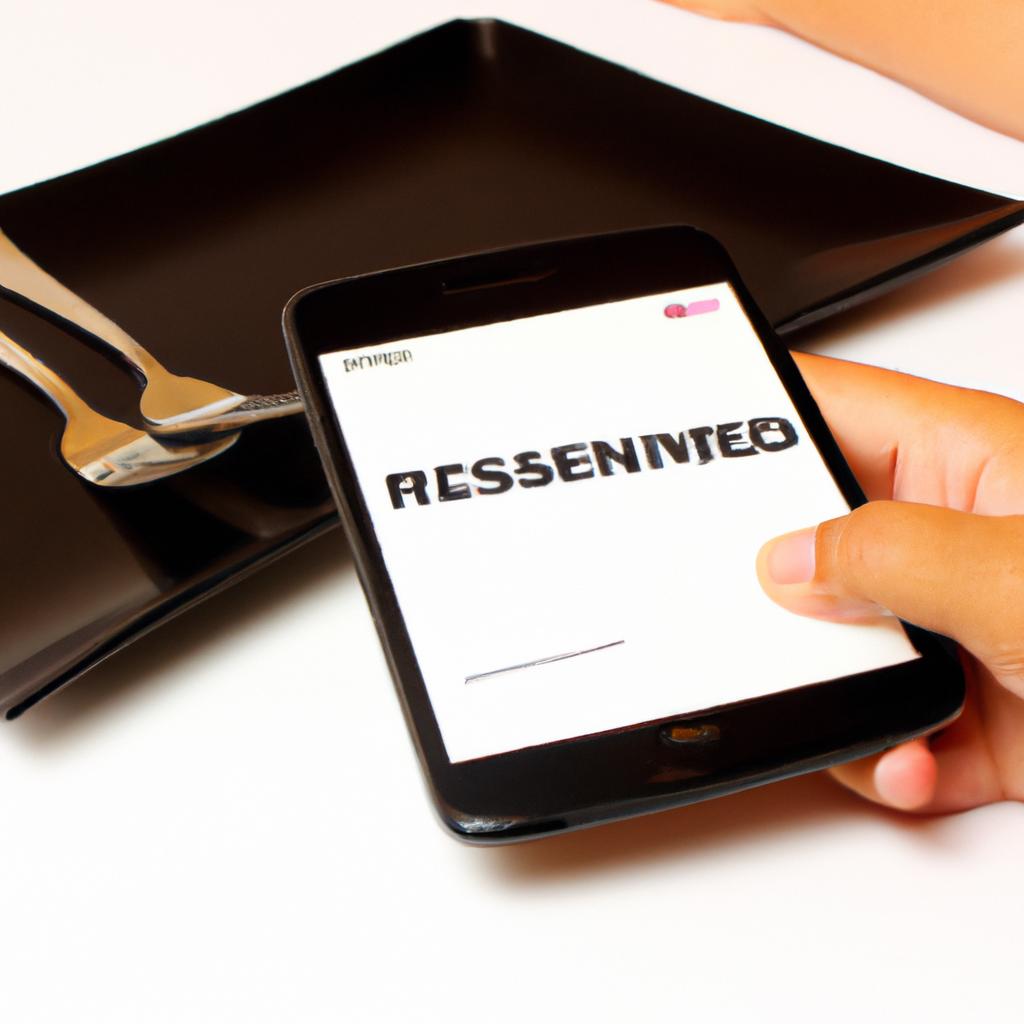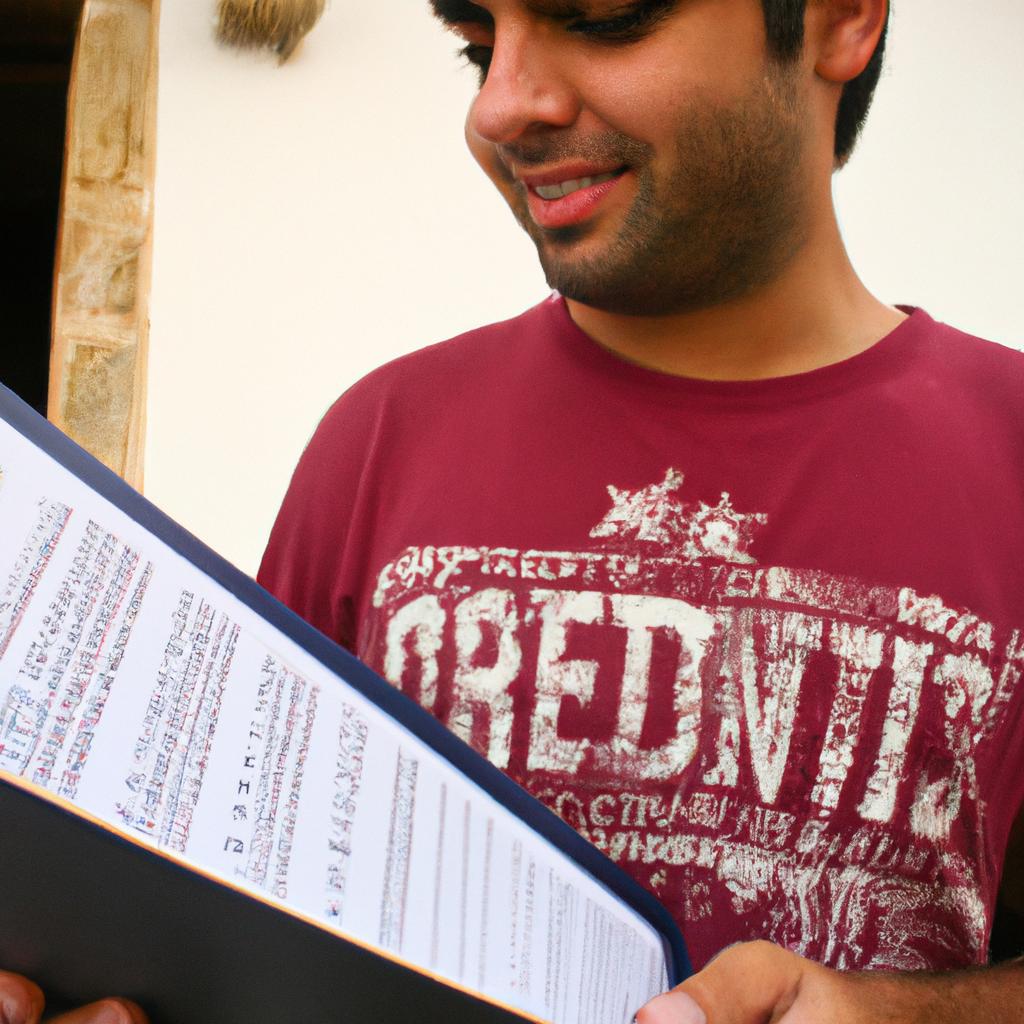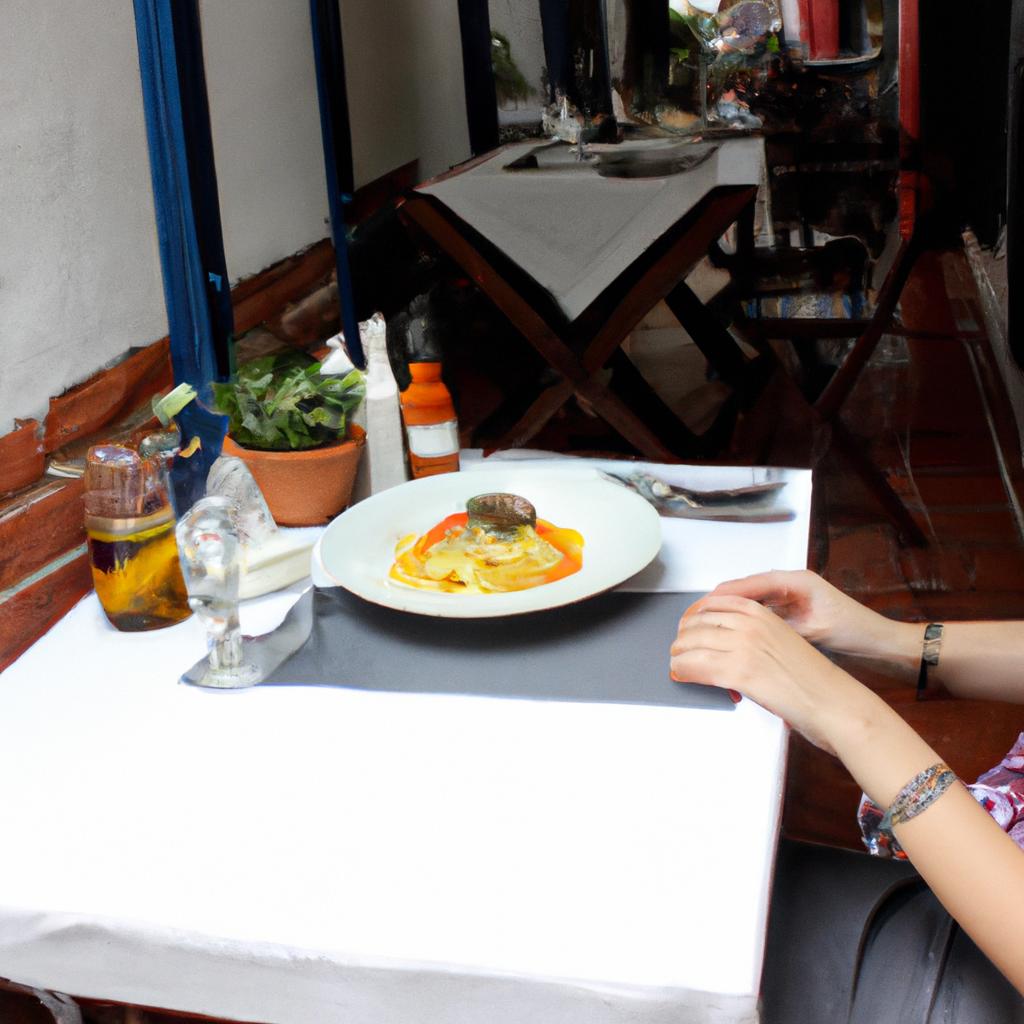Reservation Options for Dining & Lodging: Restaurant Recommendations
In today’s fast-paced and interconnected world, making reservations for dining and lodging has become an essential aspect of planning any trip or outing. Whether it be a special occasion dinner or a weekend getaway, having the option to make a reservation can provide peace of mind and ensure a seamless experience. This article aims to explore various reservation options available for both dining and lodging, focusing specifically on restaurant recommendations. By examining case studies and hypothetical scenarios, we will delve into the benefits of utilizing reservation systems, highlighting their importance in enhancing customer satisfaction and optimizing business operations.
Imagine you are planning a romantic anniversary dinner at one of the most sought-after restaurants in town. As you excitedly browse through online reviews and menus, you come across multiple testimonials praising not only the delectable cuisine but also the convenience of reserving a table ahead of time. The ability to secure your desired date and time slot ensures that you won’t have to face long waiting periods upon arrival or risk being turned away due to unavailability. Furthermore, by opting for this reservation system, the restaurant gains valuable insights about their customers’ preferences, enabling them to personalize their service offerings accordingly.
Through comprehensive research and analysis, this article aims to equip readers with the necessary knowledge and resources to make informed decisions when it comes to making dining reservations. By exploring various reservation platforms and their features, readers will gain insights into which options best cater to their specific needs. Additionally, this article will provide tips on how to maximize the benefits of dining reservations, such as utilizing waitlist features or utilizing loyalty programs for exclusive perks.
When it comes to choosing a restaurant reservation platform, there are several popular options available in today’s market. OpenTable is one such platform that offers a wide range of restaurants worldwide, allowing users to browse through menus, read reviews, and make reservations with ease. With its user-friendly interface and comprehensive search filters, OpenTable ensures that users can find the perfect dining spot tailored to their preferences.
Another notable reservation platform is Resy, which focuses on providing curated selections of high-quality restaurants in major cities. Resy boasts features like real-time availability updates and personalized recommendations based on user preferences and past bookings.
For those looking for a more specialized dining experience or seeking out unique culinary adventures, Tock is an excellent choice. Tock partners with renowned chefs and establishments around the world to offer exclusive dining experiences and pre-paid reservations for sought-after events or limited-time menus.
In addition to these reservation platforms, many individual restaurants also have their own online booking systems integrated into their websites. This allows customers to bypass third-party platforms and directly reserve tables at their chosen establishment.
Nowadays, mobile applications have become increasingly popular for making dining reservations on the go. Apps like Yelp and TripAdvisor not only provide extensive information about restaurants but also offer built-in reservation capabilities for seamless planning.
To ensure a smooth reservation experience, it’s advisable to book well in advance—especially for popular restaurants or during peak seasons—to secure your desired date and time slot. It’s also important to be mindful of cancellation policies as some establishments may charge fees for no-shows or last-minute cancellations.
By taking advantage of reservation systems and platforms, both customers and restaurants can benefit greatly. Customers gain the convenience of securing their preferred dining experience, eliminating waiting times, and receiving personalized service. Restaurants, on the other hand, have a better understanding of customer demand patterns, allowing them to optimize staffing levels, manage inventory effectively, and tailor their offerings to meet customer preferences.
In conclusion, making dining reservations has become an integral part of planning any outing or special occasion. With numerous reservation options available, it’s essential to explore the features and benefits offered by different platforms to ensure a seamless experience. By embracing reservation systems, both customers and restaurants can enhance their overall satisfaction and create memorable dining experiences.
Online reservation platforms
Online reservation platforms have revolutionized the way people book dining and lodging reservations. One such platform is OpenTable, which allows users to easily make restaurant reservations with just a few clicks. For example, imagine you are planning a romantic dinner for two at a popular steakhouse in your city. With OpenTable, you can quickly check availability, select your preferred time slot, and secure your reservation without having to make multiple phone calls or wait on hold.
Using online reservation platforms offers several advantages that enhance the overall experience for both customers and businesses alike:
- Convenience: Online reservation platforms provide 24/7 access to booking options, allowing users to make reservations anytime and from anywhere. This eliminates the need to coordinate schedules or rely on business hours when making arrangements.
- Efficiency: By streamlining the reservation process, these platforms save time for both customers and staff. Users can easily browse through available options, compare prices, read reviews, and make informed decisions all within one platform.
- Flexibility: Many online reservation systems offer features like real-time availability updates and instant confirmations. This enables users to adapt their plans quickly if circumstances change or if they find better alternatives.
- Rewards programs: Some platforms incorporate loyalty programs where users earn points or receive exclusive discounts for frequent bookings. These incentives encourage customer retention and provide additional value beyond simply securing a reservation.
| Platform | Advantages | Disadvantages |
|---|---|---|
| OpenTable | Easy-to-use interface | Limited selection of participating restaurants |
| Resy | Integration with other apps (e.g., Uber) | Service fees may apply |
| Yelp Reservation | Access to user reviews and ratings | Availability may be limited in certain areas |
| Bookatable | International coverage | Not as widely known as other platforms |
In summary, online reservation platforms offer convenience, efficiency, flexibility, and potential rewards for users seeking dining and lodging reservations. With various options available, individuals can choose the platform that best suits their needs and preferences. However, it is important to consider any limitations or fees associated with each specific platform.
Moving on to phone reservations…
Phone reservations
Imagine this scenario: You are planning a special anniversary dinner at a popular restaurant known for its exquisite cuisine and romantic ambiance. The online reservation platform you usually rely on shows no availability for the desired date and time. Frustrated, you consider other options to secure your reservation and ensure a memorable evening. One alternative worth exploring is making phone reservations.
Phone reservations offer a direct line of communication between customers and dining establishments or lodging providers. While technology has evolved rapidly, many restaurants still maintain traditional methods of accepting bookings over the phone. This approach allows patrons to speak directly with staff members who can provide personalized recommendations and address specific inquiries related to their visit.
When considering whether to make phone reservations, it’s essential to weigh the advantages and disadvantages:
Advantages:
- Personalized service: Speaking with a staff member enables you to receive tailored suggestions based on your preferences.
- Immediate confirmation: Once you’ve provided all necessary details during the call, you’ll receive instant confirmation of your reservation.
- Flexibility in modifying bookings: If any changes need to be made after confirming your reservation, such as adjusting the number of guests or changing the arrival time, speaking directly with an employee offers greater flexibility.
- Building rapport: Establishing a personal connection through phone conversations may result in enhanced customer service during your actual visit.
Disadvantages:
- Limited availability during peak hours: As many people prefer calling due to its convenience, securing a reservation during busy times might prove challenging.
- Potential language barriers: Depending on the establishment’s location or staffing demographics, there could be difficulties understanding each other clearly over the phone.
- Time-consuming process: Compared to online platforms where reservations can be made swiftly, booking via telephone may require more time spent navigating menus and communicating specific requirements.
Considering these factors will help determine if making phone reservations aligns with your preference and needs when seeking dining or lodging arrangements.
In our next section, we will explore the convenience and benefits of reservation apps, which have gained popularity due to their user-friendly interfaces and time-saving features. These digital tools offer an alternative approach for making reservations while leveraging technological advancements.
[Transition Sentence] Now let’s delve into the world of reservation apps and how they can simplify your booking process even further.
Reservation apps
Having explored the convenience of phone reservations, let us now delve into another popular method for securing dining and lodging reservations – reservation apps. These digital platforms provide users with a range of benefits, from real-time availability updates to personalized recommendations based on individual preferences.
Section:
- Advantages of Reservation Apps:
One example that highlights the advantages of reservation apps is Jane’s experience. Being new in town, she wanted to find a cozy Italian restaurant that offered vegetarian options. With just a few taps on her smartphone, she quickly discovered an app that not only listed various restaurants but also provided user reviews and ratings. This allowed Jane to make an informed decision and choose the perfect place to dine.
Moreover, reservation apps offer several key benefits that enhance your overall experience:
- Real-time availability updates ensure you are aware of any changes or cancellations promptly.
- Personalized recommendations based on your preferences help you discover new establishments tailored to your taste.
- Seamless integration with maps enables easy navigation to the desired location.
- In-app notifications keep you updated about special offers, discounts, or promotions at your favorite eateries.
- Comparison Table – Popular Reservation Apps:
| App Name | Features | User Ratings |
|---|---|---|
| FoodieFinder | Extensive restaurant database | ⭐⭐⭐⭐ |
| DineOut | Exclusive deals | ⭐⭐⭐⭐⭐ |
| EatWellNow | Dietary restrictions filter | ⭐⭐ |
| ReserveIt | Loyalty rewards program | ⭐⭐⭐ |
This table presents a comparison between some notable reservation apps currently available in the market. While each app offers unique features catering to different requirements, it is essential to consider user ratings and reviews when making a decision.
- Streamlined Reservation Process:
With reservation apps, securing a dining or lodging reservation has never been easier. Simply follow these steps:
- Download the app from your device’s app store.
- Create an account by providing necessary details such as name, email address, and phone number.
- Browse through the listed restaurants or hotels based on location, cuisine, or other preferences.
- Select your desired option and specify the date and time of your visit.
- Confirm your reservation with just a few taps, and you’re all set!
As we have explored the benefits and convenience of using reservation apps for dining reservations, let us now turn our attention to another popular method of booking accommodations – hotel booking websites.
Hotel booking websites
Reservation Options for Dining & Lodging: Restaurant Recommendations
In the previous section, we discussed reservation apps as a convenient way to secure dining reservations. Now, let’s explore another avenue for making reservations: hotel booking websites. These platforms not only offer lodging options but also provide recommendations and insights into nearby restaurants.
Consider this hypothetical scenario: You are planning a weekend getaway to a new city and want to ensure you have both comfortable accommodation and exceptional dining experiences. By utilizing hotel booking websites, such as Booking.com or Expedia, you can easily find hotels that suit your preferences while also gaining access to valuable information about local restaurants.
Here is an example of how these websites enhance your dining experience:
Imagine you have booked a hotel in downtown San Francisco through one such website. As you browse through the available options, you notice that the platform provides detailed descriptions of each hotel’s amenities and services. Additionally, it offers user reviews and ratings for various nearby eateries. This information helps you make informed decisions about where to dine during your stay.
- Access to comprehensive lists of local restaurants with descriptions and customer ratings.
- Filters based on cuisine type, proximity to your accommodation, or specific dietary requirements.
- Special deals or discounts offered by certain restaurants exclusively through these platforms.
- Integration with maps and navigation tools for easy exploration of recommended dining establishments.
Furthermore, many hotel booking websites include interactive features like maps and virtual tours that allow users to visualize their potential dining experiences before even stepping foot in the city. To demonstrate this visually:
| Restaurant | Cuisine Type | Rating |
|---|---|---|
| Bella Italia | Italian | ⭐⭐⭐⭐ |
| Le Bistro | French | ⭐⭐⭐ |
| Spice Junction | Indian | ⭐⭐⭐ |
| Sushi Express | Japanese | ⭐⭐ |
In this table, you can see a snapshot of the top-rated restaurants in your chosen destination, helping you narrow down your choices based on cuisine type and customer ratings.
By leveraging hotel booking websites for dining recommendations, travelers can ensure they have memorable culinary experiences during their trips. These platforms provide valuable insights into local eateries, offer convenient filters to cater to individual preferences, and allow users to explore restaurant options visually. Now let’s move on to exploring another method of making reservations: in-person bookings at restaurants.
In-person reservations
Case Study:
To illustrate the convenience and benefits of online reservations, let’s consider a hypothetical scenario. Imagine you are planning a weekend getaway to a popular tourist destination. You have heard great things about a specific hotel that also boasts an exceptional restaurant. Excited by this prospect, you decide to make your reservation online to secure both accommodations and dining arrangements.
Making use of online booking platforms allows travelers like yourself to access a wide range of options conveniently from their computer or mobile device. Here are some advantages:
- Ease of Use: Online reservation websites provide user-friendly interfaces that allow customers to search for available hotels and restaurants based on their preferred location, dates, amenities, and price range.
- Time-Saving: By eliminating the need for phone calls or in-person visits, online bookings save valuable time during hectic travel preparations.
- Detailed Information: Websites often include comprehensive descriptions, customer reviews, menus (in the case of restaurants), photographs, and ratings for users’ reference when making decisions.
- Competitive Pricing: Many online platforms offer special deals and discounts not found elsewhere, enabling potential savings on both lodging and dining expenses.
Table showcasing popular online reservation platforms:
| Platform | Features | User Ratings |
|---|---|---|
| Booking.com | Extensive selection; flexible cancellation policies | 4.7/5 |
| Airbnb | Unique accommodations; local experiences | 4.6/5 |
| OpenTable | Restaurant reservations; loyalty program rewards | 4.8/5 |
| Expedia | Bundled vacation packages; reward points system | 4.5/5 |
Considering these factors, it is evident why many people opt for online reservations when planning their dining and lodging needs while traveling.
Transitioning seamlessly into our next section discussing “Reservation Policies and Cancellation Fees,” it becomes crucial to understand the terms associated with these services to make informed decisions regarding your bookings. By familiarizing yourself with these policies, you can ensure a smooth and hassle-free experience throughout your trip.
Reservation policies and cancellation fees
Having discussed the process of in-person reservations, it is important to consider various reservation policies and cancellation fees that may apply. By understanding these factors, patrons can make informed decisions when making dining or lodging arrangements.
Reservation Policies and Cancellation Fees
To illustrate how reservation policies vary among establishments, let’s take a hypothetical scenario involving two popular restaurants in a bustling city. Restaurant A requires customers to secure their reservation with a credit card but does not charge any upfront fee. However, if the reservation is cancelled within 24 hours of the scheduled time or if the party fails to show up altogether, a cancellation fee equivalent to 50% of the total bill will be charged. In contrast, Restaurant B allows free cancellations up to 48 hours before the reserved time; otherwise, they impose a fixed penalty of $20 per person on the booking credit card.
Understanding such reservation policies is crucial for anyone planning restaurant visits or accommodations. Here are some common elements found in these policies:
- Deposit requirements: Some high-end restaurants or hotels may ask for an upfront deposit at the time of booking to secure the reservation.
- Minimum spend agreements: Certain establishments have minimum spending requirements during peak times or special events.
- Reservation release timings: Restaurants often hold tables for limited durations after your reserved time slot has passed before releasing them to other guests.
- Group size limitations: Larger parties might face restrictions due to space limitations or preferential treatment given to smaller groups.
Considering these policy aspects can help individuals avoid unexpected charges and ensure an enjoyable experience while dining out or staying overnight at hotels.
- Uncertainty regarding cancellation penalties can cause anxiety while making reservations.
- Transparent policies build trust between businesses and customers.
- Fairness in reservation policies fosters customer loyalty.
- Clear communication about policies minimizes misunderstandings and disputes.
Emotional Table:
| Reservation Policy | Restaurant A | Restaurant B |
|---|---|---|
| Credit card requirement | Yes | No |
| Cancellation fee within 24 hours | 50% of total bill | N/A |
| Free cancellation up to 48 hours before reserved time | N/A | $20 per person penalty |
By being aware of these reservation policies and understanding the potential implications, patrons can make informed choices that align with their preferences and circumstances. Ultimately, this knowledge empowers individuals to enjoy memorable dining experiences or comfortable lodging arrangements without any unwelcome surprises.



